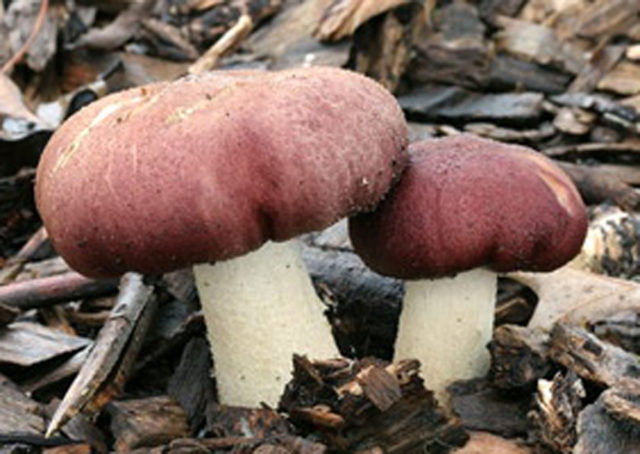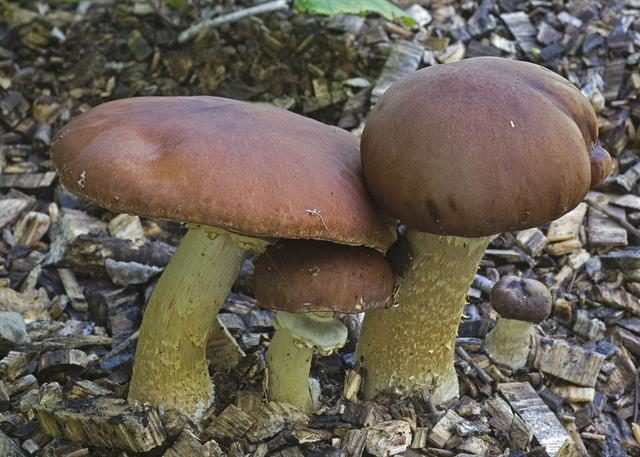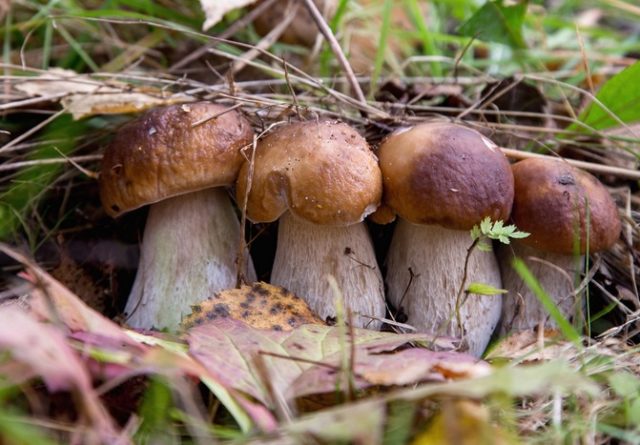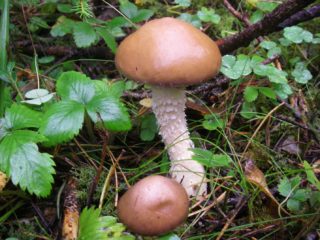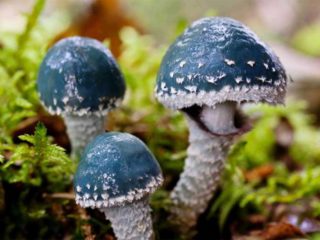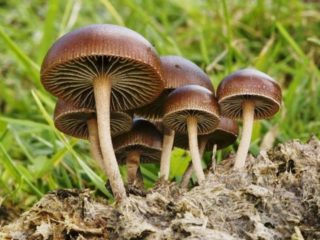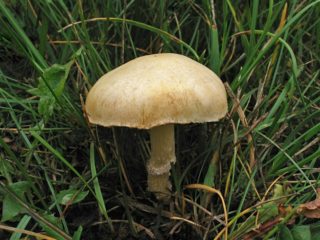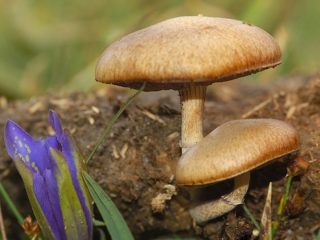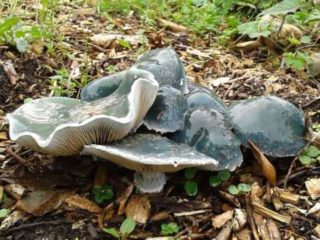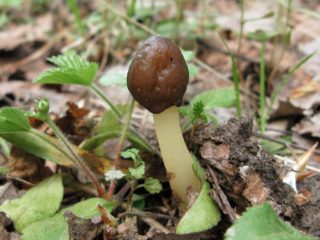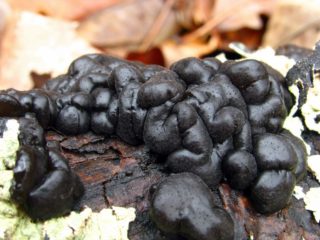Content
Stropharia rugose-annular is an interesting mushroom with an unusual name, which belongs to the Strophariev family. It looks pretty attractive, is edible, and is easy to grow at home.
What does stropharia wrinkled-annular look like?
In appearance, young wrinkled-ring stropharians resemble boletus - strong white legs and brown caps.
A distinctive feature is a well-visible ring on the stem. Stropharia are lamellar mushrooms, edible and very healthy.
If you break the cap, you can see a yellowish flesh with a special rare smell and a pleasant taste.
Description of the hat
Stropharia is a fairly large mushroom. Its cap can reach 20 cm in diameter. Its shape resembles a hemisphere at a young age, and is connected to the leg with a thin skin.
As the fungus grows, the skin bursts, and the cap becomes flatter, the grayish lamers darken, acquiring a lilac hue.
The surface of the cap of the young stropharia is yellowish or red-brown. Mature specimens can be light yellow or chocolate brown.
Leg description
The mushroom stem is white or yellowish brown, with a well-visible ring. It is filled with dense pulp, slightly thickened at the base. The leg length of an adult mushroom can reach 15 cm.
In young mushrooms, the stem is small - about 7 cm, most often white, the ring is imperceptible, since the cap is still connected to it by a membrane.
Where and how it grows
In nature, Stropharia wrinkled-annular are very rare. They grow on rotted plant debris outside the forest, sometimes found on forest edges.
Since the 60s of the twentieth century, Stropharia wrinkled-ring is grown industrially. They are less whimsical to growing conditions than champignons. In nature, these mushrooms can be found from early summer to mid-autumn.
Doubles and their differences
Young ringlets are often confused with noble porcini mushrooms or boletus. They are very similar in appearance, but if you look under the cap, you can see the plates, while in porcini mushrooms there is a tubular layer in this place, resembling a sponge.
Boletus is a valuable edible mushroom.
The fruiting body of the ringworm can be confused with Stropharia Hornemann. This is a poisonous mushroom. It has a cap up to 12 cm in diameter, red or yellow-brown, white flesh, odorless and tasteless, an even whitish leg with a ring.
Is the ringlet edible or not
Stropharia rugose-annular is a valuable edible mushroom, with a dense, pleasant-tasting pulp. After cooking, it tastes like a boletus. Has a specific, pleasant aroma, similar to that of a radish. The benefit of the ringlet for the body lies in the high protein content in the pulp, rich in mineral and vitamin composition.
How to cook a ringlet
You can cook many delicious mushroom dishes from wrinkled ring stropharia - fry in sour cream or with potatoes and onions, add to soup. For long-term storage, these mushrooms are salted, pickled, dried and frozen. Several interesting recipes will be useful for lovers of mushroom dishes.
Breaded ringlets
The caps of the peeled and washed mushrooms are cut off, dried on a napkin. Heat oil in a frying pan. Mushroom caps are moistened in an egg with a pinch of salt and black pepper. Then they are rolled in flour or breadcrumbs and fried in a hot skillet. For 1 kg of mushrooms, you need 2 eggs and half a glass of butter.
Mushrooms in sour cream
To prepare this mushroom stew, the ringlets are washed and cut into slices. Fry chopped onions in hot cooking oil, then add mushrooms, and fry for about 30 minutes more. At the end, add salt, spices to taste, sour cream with water and flour. To prepare 1 kg of mushrooms, take 50-60 g of fat, a large onion, a glass of sour cream, a little water and 1 tsp. flour with top, salt and spices - as needed.
Pickled stropharia wrinkled ring
Small young mushrooms are best suited for this harvest. First, they are washed under running water, cleaned, and boiled for about 20-30 minutes with the addition of onions. Then the water is drained, the mushrooms are laid out in jars, and poured with marinade with vinegar and bay leaves. For 1 kg of boiled mushrooms, a marinade of 2 tbsp is required. water, 1 tbsp. l. salt, 1 tbsp. l. sugar, 2 bay leaves and 2 tbsp. l. vinegar 9%.
Why is the ring stick useful?
The mushroom pulp of Stropharia rugose-annular contains a large amount of B vitamins and niacin. In terms of their mineral and vitamin composition, these mushrooms are superior to vegetables such as cabbage, cucumbers and tomatoes.
Nicotinic acid has a beneficial effect on the digestive organs and the functioning of the nervous system. Relieves inflammation of the gastrointestinal tract, stimulates intestinal motility.
How to grow a ringlet at home or on a site
For growing ringlets at home, a special nutrient substrate is made. A shaded place is chosen for landing, which is protected from wind and cold. These thermophilic mushrooms grow well in basements and greenhouses under a film, on shaded vegetable beds.
For the development of the mycelium, the substrate temperature should be at least + 25 ° C, and during fruiting - at least + 21 ° C. Some gardeners practice the cultivation of wrinkled ring stropharia in beds with zucchini, pumpkins, watermelons or melons. The large leaves of these crops protect the mushrooms from the sun.
Mushroom mycelium grows well in a substrate of hardwood chips, cereal straw or shredded corn stalks. Minerals and manure are not used. The mycelium is cut into pieces the size of a small walnut and planted to a depth of about 5 cm in the prepared substrate.
After planting, the surface of the beds is moistened, leveled, and covered with burlap or agrofibre to maintain high humidity. The air temperature must be at least + 20 ° C. When the substrate turns white, this should take about a month, the shelter is removed, and the surface of the bed is sprinkled with a layer of earth about 5 cm thick.A mixture of peat and leaf humus in an equal ratio is used as mulch.For sprouting mycelium, it is necessary to provide diffused light, optimal humidity and ventilation. After 1-2 weeks, you can harvest the first mushrooms by twisting them out of the soil by hand.
Conclusion
Stropharia rugose-annular is a delicious edible mushroom that is rarely found in the forest. Most often it is grown industrially in greenhouses or in personal plots. Stropharia wrinkled-annular contains many useful minerals and vitamins for the body, has a special, rare aroma and attractive appearance.

